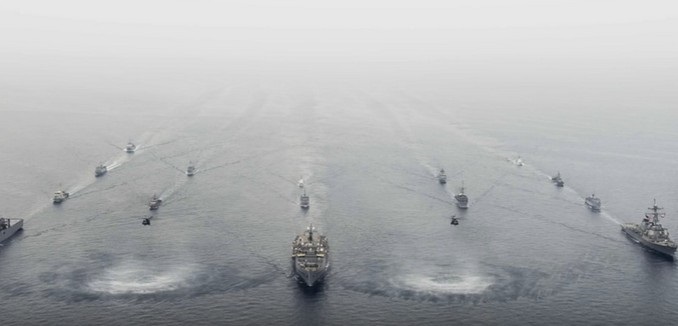The deputy commander of Iran’s Islamic Revolutionary Guard Corps (IRGC) said on state television Wednesday that his nation would close the strategic Strait of Hormuz to the United States and its allies if they “threaten” Iran.
“If the Americans and their regional allies want to pass through the Strait of Hormuz and threaten us, we will not allow any entry,” Brig. Gen. Hossein Salami said. He did not specify what would constitute a threat.
“Americans should learn from recent historical truths,” Salami said, in a possible reference to the capture of ten American sailors by IRGC forces in January. He later added that “Americans cannot make safe any part of the world.” Salami cited the United Nations Convention on the Law of the Sea as a justification to “decisively confront” any threat through the Strait of Hormuz. The text of the Law of the Sea also codifies sovereign immunity, which Iran violated when it seized the ships.
Lt. Rick Chernitzer, a spokesman for the U.S. Navy’s Fifth Fleet in Bahrain, said in a statement to the Associate Press that American forces “remain thoughtful, vigilant and responsible mariners as we conduct our operations here. We do, however, reserve the inherent right to self-defense.”
Salami’s threats followed similar comments by Iranian Supreme Leader Ayatollah Ali Khameini, who said earlier this week that “The Persian Gulf coast and much of the coasts of the Sea of Oman belong to this powerful [Iranian] nation, therefore we have to be present in this region, [stage] maneuvers and show off our power.”
Khamenei also accused the United States of warning Iran not to hold military exercises in the Persian Gulf, a claim that has not been corroborated in Western media. Khamenei may have been responding to the U.S.-led multinational military exercise in the Persian Gulf last month. More than 30 nations participated in the International Mine Countermeasures Exercise in the Strait of Hormuz, the Bab-el-Mandeb Strait, and the Suez Canal to ensure the safe passage of commercial traffic through major transport chokepoints.
Cartoon | They come to #PersianGulf & hold military drills. What are You doing here? You should go to Bay of Pigs! pic.twitter.com/jz9ayHVRVa
— Khamenei.ir (@khamenei_ir) May 3, 2016
Iran has stated that it plans to hold 20 naval exercises in the Persian Gulf by next March.
Iran has been criticized for its provocative behavior in the Persian Gulf over the past year. Vice Admiral Kevin Donegan, the commander of the Fifth Fleet, said when he was installed in his position in November that Iran’s “malign behavior” in the region had not changed despite last year’s nuclear deal. The following month, an Iranian ship fired rockets close to the USS Harry S Truman in a maneuver that U.S. Central Command called “highly provocative.
In January, IRGC naval forces captured ten American sailors and two boats that were reported to have strayed into Iranian territorial waters. Iran awarded medals to the captors and broadcasted their images being held at gunpoint on state television. Khamenei called the capture “God’s deed,” and the country is planning to construct a monument to commemorate the capture.
Iranian officials have also been provocative towards the United States on other issues recently. Last week, Khameni called the United States Iran’s main enemy and mocked President Barack Obama’s Nowruz holiday greeting to the Iranian people. The governor of Iran’s central bank, Valiollah Seif, threatened last month that if the United States does not facilitate Iran’s reintegration into the international financial system, the nuclear deal will “[break] up under its own terms.” Similarly, in an interview with The New Yorker last week, Iranian Foreign Minister Mohammad Javad Zarif said that “if one side does not comply with the agreement then the agreement will start to falter.”
[Photo: ABC News / YouTube ]




